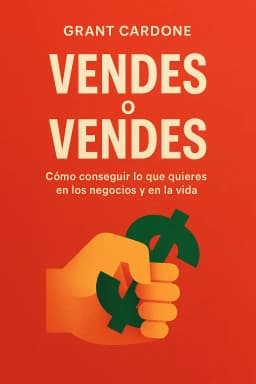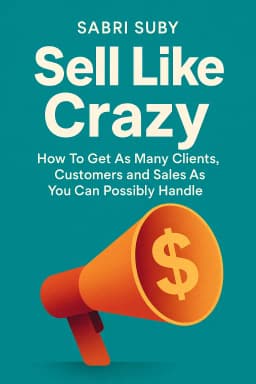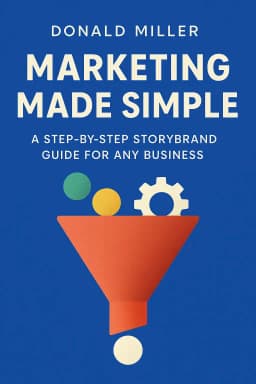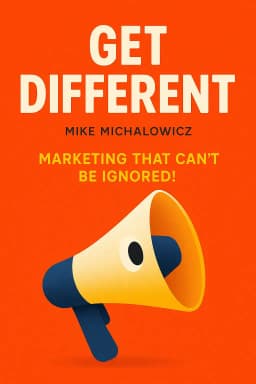
Cardone's Controversial Code
Golden Hook & Introduction
SECTION
Olivia: Alright Jackson, quick—Grant Cardone's Sell or Be Sold. What's the first image that pops into your head? Jackson: A guy in a suit, yelling at me from a private jet to sell my own grandmother a pen. Am I close? Olivia: You're not not close. And that's exactly what we're diving into today. Jackson: I knew it. The energy is just palpable, even from the book cover. Olivia: It is. That's the perfect entry point for Grant Cardone's Sell or Be Sold: How to Get Your Way in Business and in Life. He's this larger-than-life figure, a real estate mogul who founded the whole '10X Movement'. Jackson: The guy who says to multiply your goals and your effort by ten, right? Olivia: Exactly. And what's fascinating, and what I think grounds his whole philosophy, is that he apparently wrote this book from a place of hating sales because he was absolutely terrible at it. He only became this evangelist after he forced himself to master it, which frames his entire, very intense, worldview: success isn't an option, it's a duty. Jackson: A duty. Wow, no pressure then. So where does this 'duty' to sell begin? Is it just for people in business, or is he talking to all of us? Olivia: Oh, he's talking to all of us. That’s the first and most provocative idea in the book. He argues that selling isn't a job. It's a prerequisite for life.
Selling as a Prerequisite for Life
SECTION
Jackson: A prerequisite for life? That sounds a bit extreme. I mean, I get it for a CEO or an entrepreneur, but for a teacher? A doctor? A parent? Olivia: According to Cardone, absolutely. He says whether you're a kid trying to convince your parents for a later bedtime, an employee asking for a raise, or even a golfer trying to mentally will the ball into the hole, you are selling. You're persuading, negotiating, and trying to get your way. Jackson: Huh. When you put it like that, it's hard to argue. We are all trying to influence outcomes. But he takes it to another level, doesn't he? Olivia: He takes it to the ultimate level. The most powerful, and frankly, most controversial story he tells to prove this point isn't about business at all. It's about how he met his wife, Elena. Jackson: Oh, I have a feeling this is going to be good. Olivia: It’s a saga. He sees her, is instantly smitten, and decides she's the one. The problem? She is completely, utterly uninterested. She won't give him the time of day. Jackson: A classic story. So what does he do? Olivia: He gets her number and calls her. And calls her. And calls her. For an entire year. He would leave these upbeat, positive voicemails, but she never once called him back. Jackson: A whole year of calls? That's... intense. Is that persistence or just ignoring some pretty clear signals? Olivia: That's the million-dollar question with Cardone, isn't it? His own mother told him, "Grant, it takes two to make a relationship. You can't force it." But he completely rejected that. He decided, "No, buyers don't buy until someone sells them. It only takes one person to make a sale happen, and I'm going to be that person." Jackson: Wow. He literally saw winning over his future wife as a sales campaign. That's... a mindset. So how did he finally close the deal, so to speak? Olivia: He realized his current approach wasn't working, so he did what any good salesperson would do: he researched his "client." He found out through a mutual friend that Elena was a passionate sport shooter. She loved going to the gun range. Jackson: No way. Olivia: Yes. So he immediately called her with a new pitch. He didn't ask her to dinner. He said, "I know you're into shooting. I've never done it, but I just booked us a private lesson at a shooting range. We're going." He didn't ask; he presented an offer that was tailored to her interests. Jackson: And she said yes? Olivia: She said yes. That was their first date. They were married less than a year later. He calls it the most important and difficult sale of his entire life, more important than any multi-million dollar real estate deal. Jackson: That is an incredible story. And it perfectly illustrates his point. But it also walks a very fine line. A lot of critics of Cardone point to this kind of thinking—this relentless, individualistic pursuit—as being a bit problematic. It frames every human interaction, even love, as a transaction. Olivia: It absolutely does, and that's the core controversy. His philosophy is that if you want something, it's your duty to get it, and selling is the tool. For him, it's empowering. For others, it can feel a bit predatory. But for Cardone, that intensity is the only thing that separates the true professionals from the amateurs.
The Mindset of a 'Great': Conviction and Massive Action
SECTION
Jackson: That's a perfect bridge, because I wanted to ask about that. This idea of a 'professional' versus an 'amateur'. It's not just about skill, it's a whole different psychological state for him, right? Olivia: Completely. He says the first thing that separates the greats is conviction. And not just normal belief. He advocates for an almost irrational level of conviction in your product, your company, or yourself. You have to be so sold on it that you can't fathom why someone else wouldn't be. Jackson: Irrational belief? That sounds like a recipe for disaster for most people. It sounds like delusion. Olivia: He would say it's the only thing that works. It's the engine that powers you through rejection. This conviction then has to be paired with his second big rule: Massive Action. This is the 10X Rule in practice. Don't just do what's necessary; do ten times more. Jackson: Okay, but what does 'massive action' actually look like? Is it just about working 100-hour weeks and burning yourself out? Olivia: It's more about the mentality. It's about creating a situation where you have no other choice but to succeed. He has this amazing story from when he was younger, working on an oil rig maintenance team in Louisiana. Jackson: I'm sensing another wild anecdote. Olivia: You know it. So, his team would go fishing to pass the time. One day, they catch hundreds of red snappers. His coworkers are just planning to take a few home. But Cardone, who had never sold a thing in his life, has an idea. He buys all the fish from everyone on the boat. Jackson: With what plan? Olivia: No plan! He just loads them into his truck, throws some ice on them, and realizes he has a huge problem: he has a truck full of fish that will spoil in a few hours and he's invested all his money. He has to sell them. Jackson: He created his own do-or-die scenario. Olivia: Precisely. He calls it "burning the ships." There's no retreat. So he starts driving through neighborhoods, literally yelling out the window that he's got fresh fish. He goes door-to-door. When he's done with the neighborhoods, he goes to local businesses. He sold every single fish before the ice melted and made more in that one afternoon than he did in two weeks on the rig. Jackson: That's incredible. He manufactured his own pressure. But again, for every Grant Cardone who succeeds with that, how many people end up with a truck full of rotten fish? Olivia: That's the risk, and he acknowledges it. He says massive action will create new problems. You'll have too many clients, too much demand, too much to do. But he argues those are good problems. They are the problems of success. The alternative is the problem of failure: no clients, no demand, nothing to do. He believes that productivity, not work-life balance, is what truly leads to happiness. Jackson: So the goal is to be overwhelmed with success, not underwhelmed with mediocrity. It's a very all-or-nothing philosophy. Olivia: It is. There's no middle ground in Cardone's world. You're either selling, or you're being sold to. You're taking massive action, or you're stagnating. And this same counterintuitive logic applies to his actual sales tactics.
The Surprising Mechanics of a Sale: Debunking Price and Mastering Agreement
SECTION
Jackson: Alright, so we have the universal mandate to sell and the fanatical mindset to back it up. But what about the actual conversation with a customer? What's the secret trick when you're face-to-face? Olivia: Well, his biggest "trick" is to debunk what most salespeople think is the most important thing: the price. He says the price is almost never the real reason you lose a sale. Jackson: Come on. That can't be true. Price is a huge factor for everyone. Olivia: He argues it's a convenient excuse. The real reason is that the customer isn't convinced the product is right for them, or they don't trust the salesperson. He proved this with a fascinatingly disastrous experiment. Jackson: Let's hear it. Olivia: He was running these popular sales seminars. A colleague insisted that if they just cut the price, they'd double attendance. So, in Detroit, a city where he had a strong following, he decided to test it. He dropped the ticket price to one-tenth of the normal cost. Jackson: And attendance exploded? Olivia: It cratered. It was the lowest-attended seminar of his entire career. People who did show up said they assumed it was a scam or that he wouldn't even be there in person because the price was so low. It devalued the entire offering. The next time, he doubled the price, and he doubled the audience. Jackson: Wow. So a low price can signal low value. That makes sense. People pay thousands for a phone when a cheaper one does the same thing. They're buying the brand, the experience, the feeling. Olivia: Exactly. They're buying the love for the product. He says if a customer truly loves something and believes it will solve their problem, they will find the money. The salesperson's job is to build that love and trust, not to haggle over numbers. Jackson: Okay, that's a powerful reframe. What's his other big counterintuitive tactic? Olivia: It's even more paradoxical. His golden rule is: "Always, always, always agree with the customer." Jackson: Wait, agree with them even when they're wrong? Or when they're making an absurd demand? How is that not just being a doormat? Olivia: It's not about being a doormat; it's about controlling the conversation. He argues that disagreement creates a wall. The moment you say "No, but..." or "Actually...", you've created an adversarial dynamic. Agreement, on the other hand, disarms them and builds rapport. Jackson: So it's kind of like the 'yes, and...' rule in improv, but for closing a deal? Olivia: That's a perfect analogy. For example, a customer says, "Your price is way too high!" The amateur salesperson argues, "Well, it's because of our quality, and our features are better..." The professional, Cardone-style salesperson says, "You're absolutely right, it is a lot of money. I agree with you. And that's exactly why you should invest in it, to get the best value." You agree with the feeling, then you reframe the logic. Jackson: I see. You're not agreeing that the price is unfair, you're agreeing that the number is large. You validate their feeling, which makes them more open to your next point. Olivia: Precisely. You're removing the conflict. He says it only takes one person to create an agreement. By being the one to agree first, you soften the client, you appear reasonable, and you open the door to actually influence them. You can't sell to someone you're fighting with.
Synthesis & Takeaways
SECTION
Olivia: So when you pull it all together, it's really a three-legged stool. First, there's the core belief that you are always selling, in every part of your life. Second, there's the fanatical, irrational conviction and massive action you need to bring to that sale. And third, there's the tactical grace to navigate the actual human interaction by focusing on value over price and agreement over conflict. Jackson: It's a comprehensive, if incredibly intense, life philosophy. So what's the one thing people should take away from this? Is the message just 'be more aggressive'? Olivia: I think the most useful takeaway isn't about aggression, but about conviction. Cardone's core message, the one that underpins everything, is that if you don't 100% believe in what you're offering—whether that's a product, an idea, or yourself—you've already lost. Jackson: The most important sale is always to yourself. Olivia: That's it. You have to be your own first and most fanatical customer. If you can't sell it to yourself, you have no business trying to sell it to anyone else. Jackson: That's a powerful thought. And it applies whether you're in a boardroom or just trying to convince your friends to try a new restaurant. We'd love to hear what you all think. Is this philosophy empowering or a bit much? Let us know your take on our socials. Olivia: This is Aibrary, signing off.









